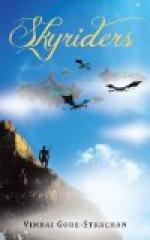His manner of thinking it over calmly was rather pathetic. It consisted of building anew his air castle, and in riding out to the forbidden lava ridge that rose like a wall out of the sandy plain west of Sinkhole to choose the niche which might best be converted into a secret hangar. Since first he heard of the derelict airplane, his mind had several times strayed toward those deep clefts, but his feet had heretofore refrained from following his thoughts.
Niches there were many, but they were too prone to yawn wide-mouthed at the world so that whatever treasure they might have contained would be revealed to any chance passer-by. These Johnny disdained without a second glance. Others he investigated by riding in a little way, sending a glance around and riding out again.
Just before dusk, as he was returning disappointedly after looking as far as was practicable, his horse Sandy swung into one of the open-mouthed depressions of his own accord. Probably he had become convinced that they were hunting stock, and that every niche must be entered. (Range horses are quick to form opinions of that sort and to act upon them.) Johnny was dreaming along, and let Sandy go back toward the wall, but Sandy, poking along with his head bobbing contentedly at the end of his long neck, swerved to the right, into a nature-built ell that had a fine-sifted sand floor, walls that converged toward the top, and an entrance which no one would suspect, surely, since Johnny himself had passed it by not half an hour before.
Johnny did not say a word. He sat there and gazed, a little awed by the discovery, thrilled with the feeling that this place had been planned especially for him; that Nature had built it and kept it until he needed it—in other words, that luck was with him and that it would be madness to go against his luck.
He got down, went to the left wall and, taking long strides, stepped off the width of the place. Wide enough, plenty; he couldn’t have ordered it any better himself. From the mouth he started to step the depth, but stopped when he had gone a third farther than the length of a military type fuselage. He turned and looked back toward the entrance, his hands on his hips, his eyes wide and glowing, his lips trembling and eager. He looked up at the top; with cottonwood poles and brush he could roof it against the sun and the winds. He looked at the fine, hard-packed sand floor that the winds never stirred. He looked at the walls.
But he would put his luck to another test. He would abide by it—so he told himself bravely. He felt in his pocket for a coin, pulled out a half dollar, balanced it on his bent thumb and forefinger. He turned white around the mouth, as he always did when deep emotion gripped him. He hesitated. What if—? But if his luck was any good, it would hold. It had to hold!
“Heads, I go. Tails, I stay.” He muttered the fateful six words and snapped his thumb up straight. The half dollar went spinning, clinked against a high projection of rock, fell back to the sand floor.




